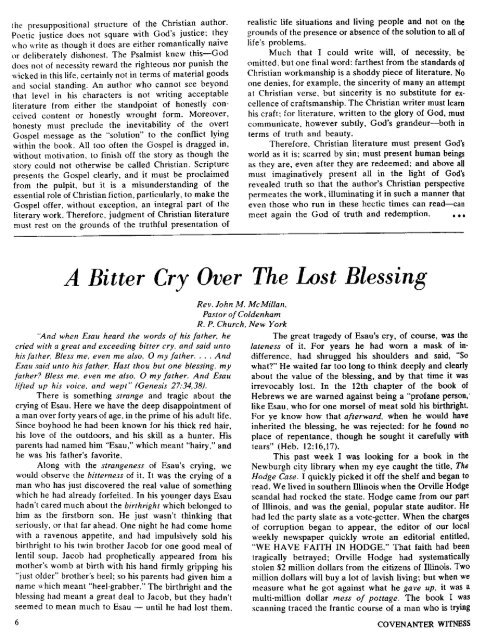Covenanter Witness Vol. 86 - Rparchives.org
Covenanter Witness Vol. 86 - Rparchives.org
Covenanter Witness Vol. 86 - Rparchives.org
Create successful ePaper yourself
Turn your PDF publications into a flip-book with our unique Google optimized e-Paper software.
the presuppositional structure of the Christian author.Poetic justice does not square with God's justice; theywho write as though it does are either romantically naiveor deliberately dishonest. The Psalmist knew this—Goddoes not of necessity reward the righteous nor punish thewicked in this life, certainly not in terms of material goodsand social standing. An author who cannot see beyondthat level in his characters is not writing acceptableliterature from either the standpoint of honestly conceivedcontent or honestly wrought form. Moreover,honesty must preclude the inevitability of the overtGospel message as the "solution" to the conflict lyingwithin the book. All too often the Gospel is dragged in,without motivation, to finish off the story as though thestory could not otherwise be called Christian. Scripturepresents the Gospel clearly, and it must be proclaimedfrom the pulpit, but it is a misunderstanding of theessential role of Christian fiction, particularly, to make theGospel offer, without exception, an integral part of theliterary work. Therefore, judgment of Christian literaturemust rest on the grounds of the truthful presentation ofrealistic life situations and living people and not on thegrounds of the presence or absence of the solution to all oflife's problems.Much that I could write will, of necessity, beomitted, but one final word: farthest from the standards ofChristian workmanship is a shoddy piece of literature. Noone denies, for example, the sincerity of many an attemptat Christian verse, but sincerity is no substitute for excellenceof craftsmanship. The Christian writer must learnhis craft; for literature, written to the glory of God, mustcommunicate, however subtly, God's grandeur—both interms of truth and beauty.Therefore, Christian literature must present God'sworld as it is; scarred by sin; must present human beingsas they are, even after they are redeemed; and above allmust imaginatively present all in the light of God'srevealed truth so that the author's Christian perspectivepermeates the work, illuminating it in such a manner thateven those who run in these hectic times can read—canmeet again the God of truth and redemption. , ,,A Bitter Cry Over The Lost BlessingRev. John M. McMillan,Pastor of ColdenhamR. P. Church, New YorkAnd when Esau heard the words of his father, heThe great tragedy of Esau's cry, of course, was thecried with a great and exceeding bitter cry, and said unto lateness of it. For years he had worn a mask of indifference,had shrugged his shoulders and said, "Sohis father, Bless me, even me also, O my father. . . . AndEsau said unto his father, Hast thou but one blessing, my what?" He waited far too long to think deeply and clearlyfather? Bless me, even me also, O my father. And Esau about the value of the blessing, and by that time it waslifted up his voice, and wept" (Genesis 27:34,38).There is something strange and tragic about thecrying of Esau. Here we have the deep disappointment ofa man over forty years of age, in the prime of his adult life.Since boyhood he had been known for his thick red hair,his love of the outdoors, and his skill as a hunter. Hisparents had named him "Esau," which meant "hairy," andhe was his father's favorite.Along with the strangeness of Esau's crying, weirrevocably lost. In the 12th chapter of the book ofHebrews we are warned against being a "profane person,'like Esau, who for one morsel of meat sold his birthright.For ye know how that afterward, when he would haveinherited the blessing, he was rejected: for he found noplace of repentance, though he sought it carefully withtears" (Heb. 12:16,17).This past week I was looking for a book in theNewburgh city library when my eye caught the title, Thewould observe the bitterness of it. It was the crying of a Hodge Case. I quickly picked it off the shelf and began toman who has just discovered the real value of somethingwhich he had already forfeited. In his younger days Esauhadn't cared much about the birthright which belonged tohim as the firstborn son. He just wasn't thinking thatseriously, or that far ahead. One night he had come homewith a ravenous appetite, and had impulsively sold hisbirthright to his twin brother Jacob for one good meal ofread. We lived in southern Illinois when the Orville Hodgescandal had rocked the state. Hodge came from our partof Illinois, and was the genial, popular state auditor. Hehad led the party slate as a vote-getter. When the chargesof corruption began to appear, the editor of our localweekly newspaper quickly wrote an editorial entitled,"WE HAVE FAITH IN HODGE." That faith had beenlentil soup. Jacob had prophetically appeared from his tragically betrayed; Orville Hodge had systematicallymother's womb at birth with his hand firmly gripping his"just older" brother's heel; so his parents had given him aname which meant "heel-grabber." The birthright and theblessing had meant a great deal to Jacob, but they hadn'tstolen $2 million dollars from the citizens of Illinois. Twomillion dollars will buy a lot of lavish living; but when wemeasure what he got against what he gave up, it was amulti-million dollar mess of pottage. The book I wasseemed to mean much to Esau — until he had lost them. scanning traced the frantic course of a man who is trying6 COVENANTER WITNESS
















